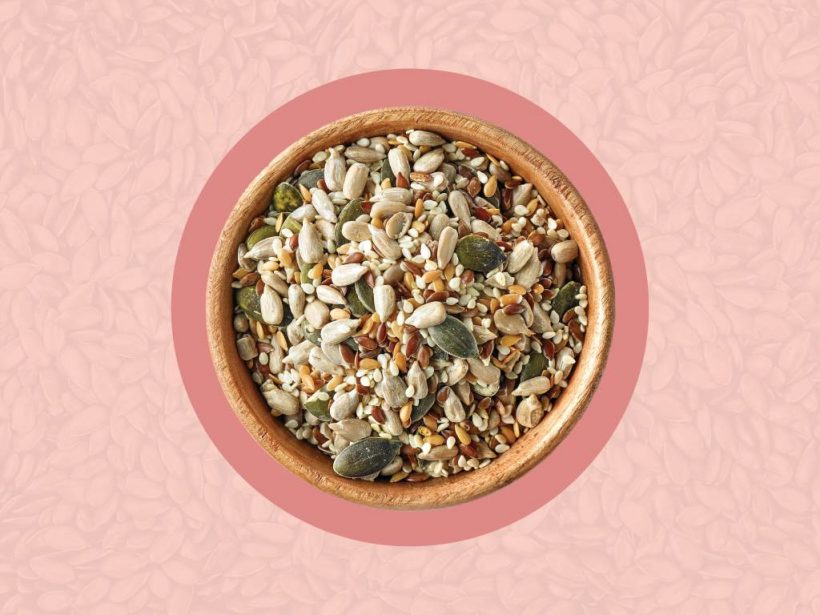
Seed cycling is a holistic method that involves eating seeds (such as pumpkin or flaxseed) to balance a woman’s hormone levels during her menstrual cycle. It has also been used by naturopathic doctors for managing hot flashes and other uncomfortable symptoms of menopause.
More recently, seed cycling has gained popularity for its possible benefits in boosting fertility among women. Advocates claim the alternative medicine technique regulates hormones such as estrogen and progesterone to boost the odds of pregnancy or managing conditions such as polycystic ovary syndrome which can contribute to infertility.
“The scientific evidence on seed cycling is still relatively limited and more research is needed to understand its full benefits and potential uses. However, some people have reported feeling positive effects from following a seed cycling diet, including improved PMS symptoms, increased energy levels, and fewer mood swings,” says Dr. Himali Maniar, an OB-GYN at Nisha Women’s Hospital & IVF center.
This alternative medicine may seem like an appealing choice for people looking for holistic approaches to wellness or for those who have tried fertility treatments with minimal success. However, with little scientific research on seed cycling, keep in mind this method has not been proven to work.
How do you get started with seed cycling?
Seed cycling involves eating different types of seeds during two phases of your menstrual cycle — the follicular phase and the luteal phase. The follicular phase is the first half of your period that can last an average of 16 days. This is the time when the pituitary gland in the brain secretes a hormone called follicle stimulating hormone to start the process of developing an immature egg and increasing estrogen levels. Someone following the seed cycling regimen would consume a tablespoon of mixed ground flaxseed and pumpkin seeds.
These seeds are rich in omega-3 fatty acids and other nutrients that are supposed to help with hormone regulation, explains Dr. Maniar. Pumpkin seeds are rich in omega-6 fatty acids, which can support hormonal balance. They are also packed with vitamin E that may reduce the negative effects of high levels of estrogen. Flax seeds have the ability to bind excess estrogen as a way of maintaining hormone balance.
By the end of the follicular phase, elevated estrogen levels prompts the pituitary gland to release large amounts of luteinizing hormone, which causes ovulation. The luteal phase starts after ovulation and makes up days 15 to 28 of a typical menstrual cycle. During this time, as the egg makes its way to the uterus and the body prepares for a potential pregnancy, a person trying this method might consume two tablespoons of sunflowers seeds or two tablespoons of ground sesame seeds. “Sunflower seeds are packed with zinc, magnesium, selenium, vitamin E, all of which have been linked to hormonal balance in women,” Dr. Maniar says. Additionally she points out that sesame seeds are high in lignans, compounds with anti-inflammatory properties and similar estrogen activity.
Does seed cycling actually help with fertility?
Seed cycling had a wave of traction as an alternative wellness trend when naturopathic practitioner Lindsey Jesswein promoted it in 2012 as a way of dealing with menstrual changes. Since then, wellness groups on TikTok have vouched for its supposed health benefits.
There are a few studies that link individual seeds like sesame and flaxseed to changes in reproductive hormone levels. Pumpkin seeds have been associated with balancing sex hormones and helping to manage heart issues in menopausal women.
“The general idea that nutrition can impact your fertility is absolutely valid,” Dr. Whitney Linsenmeyer, a registered dietitian and spokesperson for the Academy of Nutrition and Dietetics, told Today.com. “But there is no evidence that this specific practice — seed cycling — can impact fertility in any clinically significant way.”
Most health claims come from people’s personal experiences rather than medical research. “Because each woman is so unique in her hormonal makeup, I never know exactly what the benefits will be,” says Connie Pretula, a holistic wellness strategist and nutritional practitioner at Vibrant Vitality Ventures Inc who has used seed cycling herself for weight loss.
Seeds, of course, have nutritional benefits on their own, they’re a good source of protein and healthy fats. And if you’re still curious about seed cycling, Dr. Maniar says the practice is generally safe for people to try, though she advises consulting with a healthcare provider first before starting any new diet or health trend.

Source: Read Full Article







